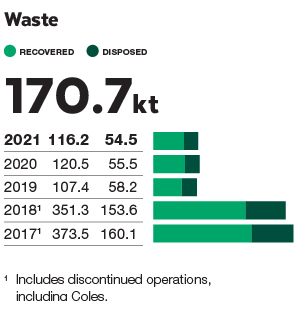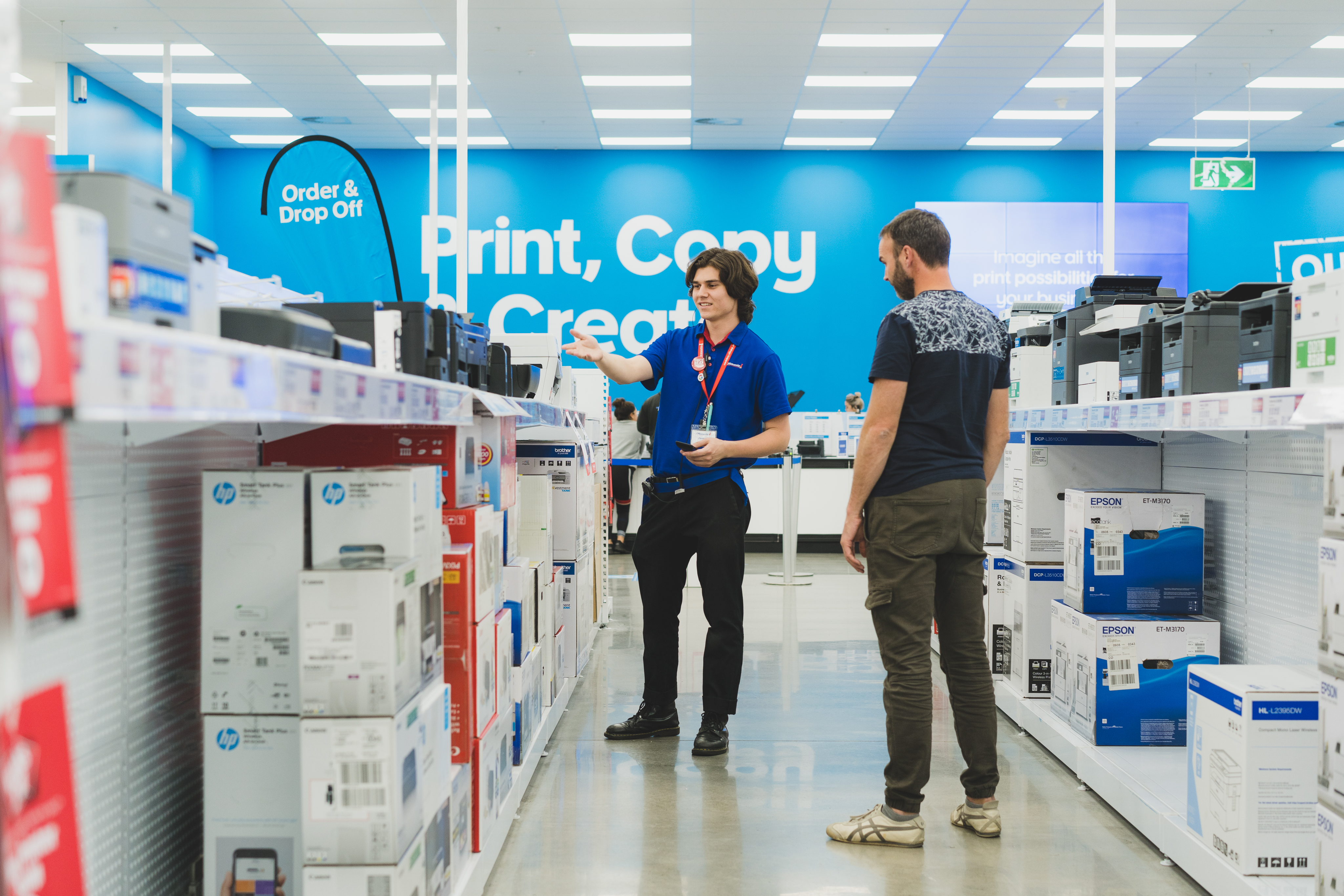Waste

Waste is a key area of focus for all our divisions. Where possible, our businesses strive to divert waste from landfill, recognising this has significant reputational and financial costs. Our retail businesses are signatories to the Australian Packaging Covenant Organisation (APCO) and report in line with its targets annually.
This year, we decreased our waste by almost three per cent to approximately 171,000 tonnes. We decreased waste disposed to landfill by almost two per cent to approximately 54,500 tonnes and decreased waste recovered by more than three per cent to approximately 116,000 tonnes.
Bunnings diverted more than 52 per cent, Kmart Group diverted almost 79 per cent and Officeworks diverted more than 91 per cent of their operational waste from landfill. The results have been achieved through initiatives such as changing the terms of current waste and recycling contracts, increasing diversion rates, monitoring waste and recycling performance, increasing reusable packaging and reducing non-recyclable materials in supply chain. This has resulted in an overall improved recycling performance for the Wesfarmers Group, with significant cost savings expected in the future.
During the year, Bunnings, Kmart Group and Officeworks worked with social enterprises, businesses and not-for-profit organisations to provide recycling programs for products including batteries, paint and electrical items such as power tools and e-waste.
Kmart Group
Waste diversion from stores and distribution centres across Kmart Group decreased from 81 per cent last financial year to 79 per cent this financial year during a period challenged by volatile markets for recycled materials, COVID-19 and some sites being impacted by changes to the Target property portfolio. The impact of one-off construction and demolition waste at Target store closures and Target Country conversions to Kmart or K hub stores has resulted in the waste diversion rate at these sites dropping to 42 per cent. By contrast, all other stores achieved a slight increase in their waste diversion to 79 per cent.
Kmart Group’s efforts to use data analytics was assisted this year with the implementation of new waste and recycling service contracts that specified more detailed and granular data requirements from our providers. This data provides the foundation for future strategic focus on waste diversion, efficient systems, accurate data collection, equipment, source separation signage and team member training in stores and distribution centres.
Kmart Group's membership of TechCollect has funded the collection and recycling of 280,519 kilograms of complying e-waste items, including televisions, computers and peripheral devices. TechCollect was set up by the Australia and New Zealand Recycling Platform as the official government-approved e-waste recycling program.
Officeworks
Officeworks is committed to doing its part to lead positive change by taking a more holistic approach to reduce waste generation across its entire supply chain.
Officeworks’ aspires to become a zero-waste business by designing out waste and maximising recycling, ensuring the packaging from all products it sells is reusable or recyclable and helping customers dispose responsibly of products at the end of their life cycle. Since establishing the Bring it Back program in 2015, Officeworks has helped its customers divert over 5,600 tonnes of unwanted products from landfill for recycling, with a goal to repair, repurpose, or recycle at least 17,000 tonnes of unwanted products by 2025.
Bunnings
Reducing operational waste is an important opportunity for Bunnings. To accelerate waste diversion, Bunnings undertook targeted waste audits in key stores across the Australian network, with the aim of providing an assessment of the current waste being generated, recovered and sent to landfill. The audits will help inform waste reduction actions for the business in the coming financial year.
Bunnings continued to work with social enterprises, businesses and not-for-profit organisations to provide recycling programs for batteries, electrical items, waste paint and packaging.
During the year, over 7,500 kilograms of batteries were collected from customers through 13 metropolitan Melbourne stores and over 1.5 million kilograms of e-waste was collected from customers through Bunnings’ South Australian network. The e-waste collected includes power tools, fans and heaters and is recycled through Minda’s Unplug N’ Drop Program. With Bunnings’ support, ongoing employment is provided through this program for 50 people with a disability.
Paint recycling events were reintroduced at Bunnings stores later in the year as COVID-19 restrictions eased. As a result, seven Paintback events were hosted at Bunnings stores, collecting over 40,000 kilograms of waste paint and packaging.
In the coming financial year, Bunnings will heighten its focus on waste reduction across the business through improved reporting and management of waste streams and increased diversion from landfill. There will also be a continued effort to collect product packaging data to aid the reduction and transition of primary, secondary and tertiary packaging across the Bunnings product range.
WesCEF
WesCEF generated a total of 12,720 tonnes of waste in the 2021 financial year, 71 per cent of which was recovered. Seventy-two per cent of this total recovered volume includes nutrient-rich wastewater generated by the ammonium nitrate business, which is sent to a facility for use in composting.
GRI 103-1, GRI 103-2, GRI 103-3, GRI 306-1, GRI 306-2, GRI 306-3, GRI 306-4, GRI 306-5
